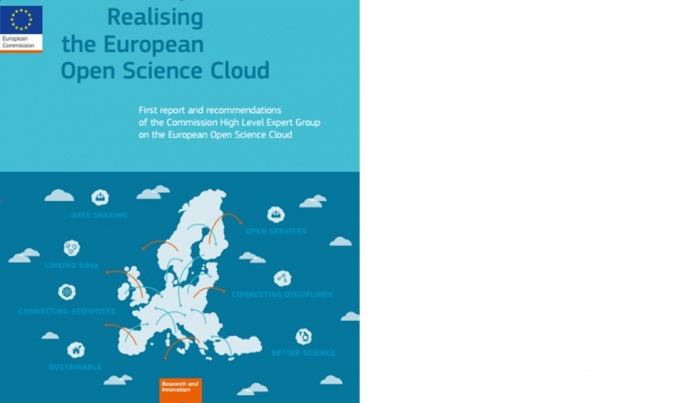European Open Science Cloud as part of Open Science
14/11/2016


In October 2016, the European Commission published the first report of the Commission High Level Expert Group on the European Open Science Cloud (HLEG EOSC). The report recommends framing the EOSC as the EU contribution to a future, global Internet of FAIR Data and Services underpinned by open protocols.
“Imagine a federated, globally accessible environment where researchers, innovators, companies and citizens can publish, find and re-use each other's data and tools for research, innovation and educational purposes. Imagine that this all operates under well-defined and trusted conditions, supported by a sustainable and just value for money model… This we believe encapsulates the concept of the European Open Science Cloud (EOSC)”, - ‘Realising the European Open Science Cloud’ Report.
The EOSC is a new flagship European Commission initiative that aims to lay out a living guide to accelerate and support the current transition to more effective Open Science and Open Innovation in the Digital Single Market. EOSC will foster best practices of global data findability and accessibility (FAIR data) as well as trusted access to services, systems and the re-use of shared scientific data across disciplinary, social and geographical borders.
Immediate, affirmative action on the EOSC in close concert with Member States, should be:
- built on existing capacity, human expertise, resources, standards, best practices;
- aided by clear Rules of Engagement for access to the EOSC (and for the provision of services based on research data). To that end, internationally effective guiding governance should be developed.
The EOSC needs to be developed as a data infrastructure commons (that is an eco-system of technical infrastructures): the EOSC is indeed a European infrastructure, but it should be globally interoperable and accessible.
EOSC’s trusted services will help address issues of access and copyright (IPR) and data subject privacy. Other key factors required for the effective development of the EOSC as part of Open Science are:
Core data experts need to be trained and their career perspective significantly improved. An important aspect of the EOSC is systematic and professional data management and long-term stewardship of scientific data assets and services;
- Modern reward and recognition practices (careers, altmetrics) need to support data sharing and re-use;
- Easier replicability of results and limit data wastage, e.g., of clinical trial data (research integrity) is urgent;
- A real stimulus of multi-disciplinary collaboration requires specific measures in terms of review, funding and infrastructure;
- New modes of scholarly communication (with emphasis on machine actionability) need to be implemented;
- Where feasible, the EOSC should enable automation of data processing (machine actionability is key);
- Key performance indicators should be developed for the EOSC;
- The funding model for research data (from data generation to preservation) should be radically changed, from traditional and rigid funding schemes of the past to an overall co-funded national/EC funding scheme.
The report estimates that on average about 5% of total research expenditure should be spent on properly managing and 'stewarding' data in an integrated fashion.
Afterwards, the report:
- provides specific (Policy, Governance and Implementation) recommendations to the Commission for a preparatory phase;
- explains the EOSC in the context of Open Science;
- presents key trends of Open Science and their relevance for the EOSC.
Read the European Open Science Cloud’ Report and understand how Open Science and Open research data infrastructure will be shaped with the EOSC.
Might be also of your interest:
- Principles for Open Scholarly Infrastructures (paper)
- It’s stupid that we care about labels so much (JISC news)
- Practical Roads To Infrastructure Reform (Bjorn Brembs blog)
- Towards a global Open Research Environment (AIMS blog)
- Got an idea for scientific research software? Apply for Digital Science Catalyst Grant of up to £15,000
